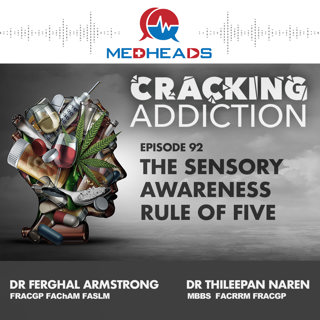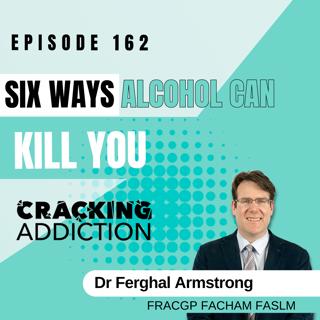
SIX WAYS ALCOHOL CAN KILL YOU
Are you curious about how alcohol really affects your heart health? In this eye-opening episode of "Cracking Addiction," Dr. Richard Bradlow and Dr. Ferghal Armstrong dive deep into the science behind alcohol consumption and its impacts on diseases like high blood pressure and heart disease. This video is packed with insights that you won't want to miss! Alcohol and heart health are two critical subjects that often spark extensive debates. In today's discussion, we'll explore the common questions that many people have about alcohol and its relationship with high blood pressure and heart disease. We'll debunk myths, reveal surprising facts, and help you understand the intricate balance between potential benefits and significant risks. We start with the famous debate on whether alcohol, especially red wine, can benefit your heart. While resveratrol in wine does have some health benefits, I explain how the harmful effects of excessive alcohol consumption far outweigh these perks. Dr. Bradlow and I cover topics like alcoholic cardiomyopathy, thiamine deficiency, and the dangerous path toward cirrhosis and other liver issues. Understanding these mechanisms will give you a clearer picture of what too much alcohol can do to your body, especially your heart.
18 Sep 202410min

Secrets to opioid weaning done right
Mastering Opioid Risk Management: Practical Tips & Life-Saving Strategies with Dr. Ferghal ArmstrongAre you concerned about the risks associated with opioids? Want to understand practical strategies for opioid risk management? This is the video just for you! Join me, Dr. Ferghal Armstrong, and Dr. Richard Bradlow as we delve deep into the intricacies of managing opioid toxicity, dependency, and safety.In this episode of Cracking Addiction, we tackle the pressing [keywords "opioid risk management"] head-on. We discuss why it's crucial to manage the risks of opioids and share actionable techniques that you can incorporate into your medical practice immediately. Our conversation covers everything from assessing the right reasons for prescribing opioids, establishing clearly defined functional goals, to the benefits of opioid rotation and utilising naloxone nasal spray (Nixoid).If you want to stay ahead in your practice and ensure patient safety, make sure not to miss this episode! We also highlight the importance of having an "exit strategy" for opioid prescriptions and discuss harm minimisation strategies for high doses. This video is packed with valuable insights and expert advice.If you found this information valuable, don't forget to like, share, and comment below. Your feedback helps us create more content that matters to you. Links and Resources:Join our community: https://meducate.com.au/For more insightful content, visit our website https://meducate.com.au/
11 Sep 202421min
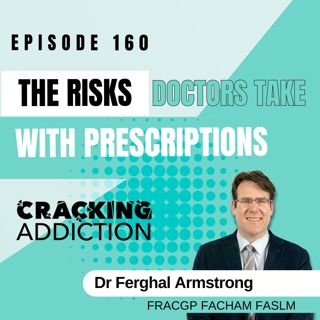
The Risks Doctors Take With Prescriptions
Are you concerned about the dangers of benzodiazepines and opioids? Curious about how these medications impact individuals with substance use disorders? In this episode of Cracking Addiction, Dr. Ferghal Armstrong and Dr. Richard Bradlow tackle the pressing issues surrounding the prescription of benzodiazepines and opioids. This is essential viewing for anyone interested in the complex dynamics of medication management and opioid stewardship.From the outset, we delve into the rising legal and ethical concerns GPs face when prescribing these medications. We discuss the escalated risks of co-prescribing benzodiazepines with other sedatives, including alcohol and opioids, which can be life-threatening. Our experts explain why saying no to persistent medication requests is difficult but sometimes necessary to uphold the principle of "primum non nocere" — do not harm.What sets this episode apart is its insightful historical context. We explore tranquilizers from the first minor tranquilizer, Milltown, to the development of major tranquilizers alongside antipsychotics and antidepressants. Dr. Bradlow’s analysis is both rich and engaging, providing a broader understanding of how these medications evolved and why benzodiazepines, despite their therapeutic window, are fraught with dependency issues.Discover the nuanced strategies for managing long-term benzodiazepine and opioid prescriptions, especially in cases involving chronic pain and opioid use disorder. Learn about the importance of clear communication and shared decision-making between doctors and patients, which is crucial for safe prescribing practices.Feel empowered in your knowledge and join the conversation on how we can navigate these challenging waters responsibly. Whether you're a healthcare professional, educator, or someone affected by substance use disorders, this video provides the insights you need.
4 Sep 202431min
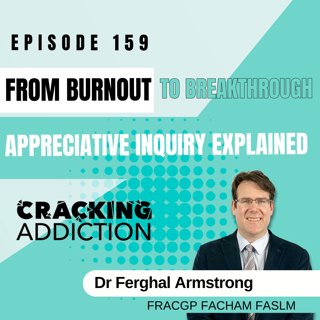
Beating Burnout: Revolutionary Techniques You’ve Never Heard Of!
In this episode, Dr. Ferghal Armstrong is joined by Andy Smith to demystify appreciative inquiry, a groundbreaking approach to solving problems by concentrating on what works. Andy walks us through his journey from an IT professional disenchanted with his career, to becoming a hypnotherapist and eventually an expert in appreciative inquiry. He discusses how appreciative inquiry diverges from traditional problem-solving methods and shares compelling case studies, including an intriguing example from a women's prison in the UK.Learning Outcomes:Understanding Appreciative Inquiry: Learn what appreciative inquiry is and how it can be more effective than traditional problem-solving methods. Unlike conventional approaches that focus on identifying and fixing problems, appreciative inquiry seeks to amplify the elements that are already working well. This shift in focus can lead to more sustainable solutions and enhanced performance.Differences from Traditional Change Management: Realise how appreciative inquiry differs significantly from conventional consulting and change management. Instead of diagnosing problems and prescribing solutions, appreciative inquiry involves facilitating people to discover their own solutions. This method benefits from the expertise of the individuals involved, promoting more personalised and relevant outcomes.Application in Varied Settings: Discover the versatility of appreciative inquiry through its application in different settings, such as healthcare and prisons. For example, Andy shares how appreciative inquiry was used to streamline a drug dispensing regime in a women's prison. This revealed not just practical solutions but also enhanced the working relationships between prison officers and nursing staff.Link with Emotional Intelligence and NLP: Appreciate the connection between appreciative inquiry, emotional intelligence, and neuro-linguistic programming (NLP). While NLP is expert-driven, appreciative inquiry is participant-driven, focusing on collaborative problem-solving. Both approaches aim to improve interpersonal skills but use different methodologies to achieve this.Actionable Takeaways:Flip the Problem: When faced with a problem, consider what the opposite of that problem looks like. For instance, if you’re dealing with high employee turnover, ask yourself what a highly engaged, content workforce would look like. This approach can open up new avenues for solutions that you might not have considered otherwise.Facilitate, Don't Dictate: When tackling issues within a team or organisation, focus on facilitating discussions rather than prescribing solutions. By doing so, you’re leveraging the collective expertise and experience of the group, which often leads to more creative and applicable solutions. This also fosters a sense of ownership and accountability among team members.Engage in Generative Conversations: Encourage open and positive conversations that focus on possibilities rather than limitations. This creates an atmosphere where team members feel safe to share ideas and are more likely to collaborate effectively. Generative conversations can lead to insights that transform how problems are perceived and addressed.Utilise Both Brain Networks: Understand the importance of alternating between the task-positive and default mode networks of the brain. Task-positive is excellent for focus and goal achievement, but to foster creativity and new ideas, the relaxed default mode network is indispensable. Create an environment where both networks can be activated as needed.
28 Aug 202419min
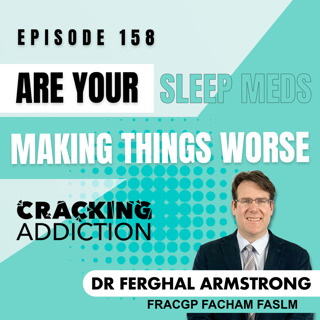
Are Your Sleep Meds Making Things Worse?
Welcome to another insightful episode of Cracking Addiction, where we delve into the intricate connections between substance use and sleep architecture. I'm your host, Dr. Ferghal Armstrong, and joining me today is Dr. Richard Bradlow.In this episode, we dive deep into understanding how various substances, particularly those that are misused, impact sleep quality and patterns. We will explore the challenging phenomenon of post-detox insomnia and its implications on relapse. Dr. Bradlow shares practical approaches to managing insomnia through lifestyle changes and short-term medication, highlighting the importance of addressing sleep issues in addiction recovery.Additionally, we discuss the critical components of sleep architecture, including sleep latency, REM sleep, and slow wave sleep, and how different substances influence these parameters. From the negative impact of alcohol and cannabis on REM sleep to the importance of deep sleep in cognitive and physical restoration, this episode covers it all.Join us as we unravel the complexities of sleep and addiction, and discover effective strategies to support those on the path to recovery.
21 Aug 202421min
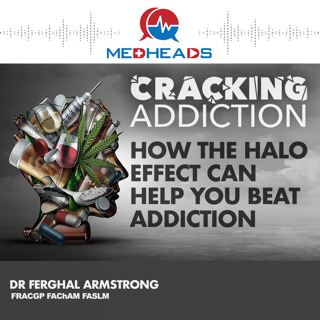
How the Halo Effect Can Help You Beat Addiction
In this episode of "Cracking Addiction," we dive deep into the concept of "resilience" and its critical role in addiction recovery. I'm Dr. Ferghal Armstrong, and joining me is the insightful Dr. Richard Bradlow. Together, we unravel the layers of how resilience can make or break the recovery process for individuals battling addiction.Resilience in addiction recovery is more than just a buzzword; it's the lifeline that enables one to bounce back amidst life’s hardships. Dr. Richard Bradlow and I discuss how resilience helps manage both the impulsivity and compulsivity associated with substance use disorders. How can we bolster this resilience in recovery? By mastering small, achievable goals, creating positive habits, and saying 'no' to cravings, of course!Are you or someone you know struggling with recovery? This episode is tailored for you. Tune in to discover practical tips, backed by real-life experiences and professional insights, to enhance your journey towards a substance-free life.
14 Aug 202413min
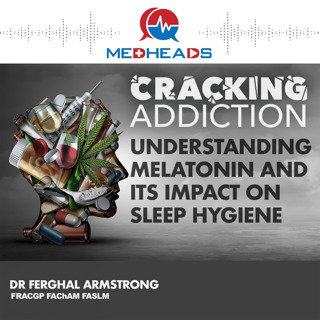
Understanding Melatonin and Its Impact on Sleep Hygiene
Dr Ferghal Armstrong and Dr Richard Bradlow explore the significance of melatonin in sleep. Melatonin, a neurotransmitter produced by the pineal gland, plays a crucial role in helping you fall asleep. The discussion touches on various aspects of melatonin including its production, function, and how it can be optimised for better sleep. Ferghal and Richard also dive into the intricacies of sleep hygiene, shedding light on actionable steps that anyone can take to enhance their sleep quality.Learning outcomes from this episode include understanding the pineal gland's role in melatonin production and the significance of melatonin in the sleep-wake cycle. Richard explains that melatonin is not just any neurotransmitter but a pivotal player in beginning the sleep process. You'll learn why blue light suppresses melatonin production and why it’s crucial to limit your exposure to screens before bedtime. You'll also discover why the body's natural rhythms dictate that sleep hygiene actually starts in the morning, highlighting the importance of light exposure and physical activity.Key points raised include the ineffectiveness of exogenous melatonin in improving sleep quality, often proving to be more of a placebo than a reliable solution. Ferghal and Richard discuss the importance of natural light exposure, particularly in the morning, to help suppress melatonin and kickstart the day. They also touch on the benefits of morning exercise and even cold showers to optimise wakefulness.### Learning Outcomes1. **Understanding Pineal Gland and Melatonin:**The pineal gland’s role in melatonin production is essential for sleep. Melatonin, a neurotransmitter, is key in initiating sleep but does not keep you asleep. Richard elaborates that melatonin production is sensitive to light exposure, particularly blue light, which can suppress its release, making it harder to fall asleep. Therefore, taking steps to manage light exposure, especially in the evening, can significantly impact your ability to sleep.2. **Ineffectiveness of Exogenous Melatonin:**Exogenous melatonin does not significantly improve sleep; often, it is no more effective than a placebo. Ferghal highlights the variability in melatonin products, especially those purchased online, and questions their reliability. This revelation underscores the importance of turning to prescribed melatonin when necessary for accurate dosing. The discussion serves as a cautionary tale about the limited benefits and potential risks of self-medicating with melatonin.3. **Role of Natural Light Exposure:**Light exposure, particularly in the morning, is crucial in maintaining your body's circadian rhythm. Ferghal stresses the importance of getting outside and absorbing natural light to suppress melatonin and signal your body that it's time to wake up. Even on cloudy days, the light outdoors significantly surpasses indoor lighting in intensity. This practice can prepare your body for a more restful night by maintaining a healthy sleep-wake cycle.4. **Importance of Physical Exercise:**Engaging in physical activity is another vital component of sleep hygiene. Richard explains that exercise, especially when done in the morning, not only benefits your overall health but also helps maintain a healthy sleep-wake cycle. While some traditionally advise against exercising close to bedtime, studies show it does not necessarily affect sleep quality. Including exercise in your daily routine, even late in the day, can support better sleep habits.### Actionable Takeaways1. **Managing Light Exposure:**Begin your sleep hygiene routine in the morning by exposing yourself to natural light. Avoid screens with blue light at least one to two hours before bedtime to prevent melatonin...
7 Aug 202428min
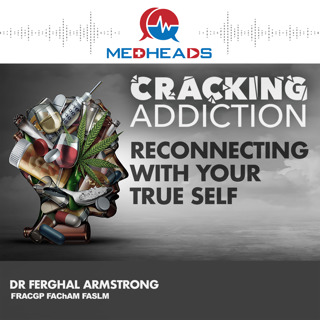
Reconnecting with Your True Self
I sit down with the inspiring Jesse Ball as we dive deep into the concept of spirituality and authenticity in recovery. The enlightening conversation reveals how Jesse transformed his life by reconnecting with his true self and breaking free from the chains of addiction. This is your opportunity to understand the profound impact of spiritual awakening and authentic living on the road to recovery.Throughout this episode, Jesse and I unpack the disconnection that fueled his addiction and explore his journey toward understanding and embracing his authentic self. Jesse shares the revolutionary moment of spiritual realization that altered his path and offers valuable insights on maintaining that authenticity in daily life. If you're seeking practical advice on personal growth, emotional vulnerability, and authentic connection, you're in the right place.Jesse's story is a beacon of hope and a testament to the power of taking responsibility for one's own life. By embracing his vulnerabilities, overcoming self-loathing, and making recovery his full-time job, Jesse discovered unimaginable strength and clarity. You'll learn how to release old narratives, confront your rock bottom, and build a life where your internal and external selves align perfectly.
31 Juli 202421min
